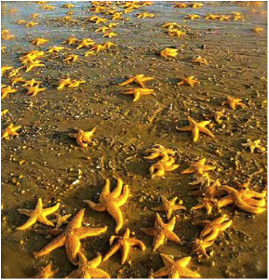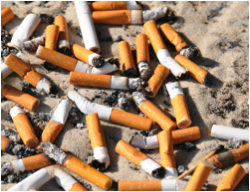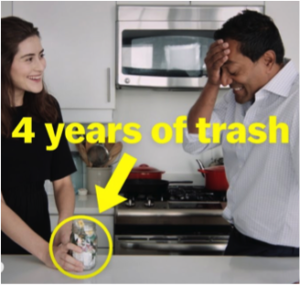
PERSPECTIVE
As an end-of-summer treat, I found my way to an isolated oceanside beach and was sitting alone when I noticed, about 50 yards away on the lumpy sand near the water’s edge, something roundish with a sparkle that encouraged me to imagine a big mother-of-pearl shell. (I have enjoyed many cool shells on this sandy stretch over the years.) This item seemed larger than a normal shell, so it especially caught my eye and interest.
I wandered over to it and discovered it was, alas, the dying remains of a formerly very purple plastic party balloon, still attached to a long string. Barely inflated anymore, it sat stuck on the beach, awaiting the next tide or breeze to carry it elsewhere, likely into the water. I tried, vainly, to tear it open so it would collapse more readily, but it was impressively strong plastic. My hands got discolored by the remaining purple dye as I crushed it for more appropriate disposal.
Getting it off the beach was a drop in the bucket, perhaps, considering the astounding amount of plastic debris currently residing in our oceans and littering our beaches. But not this piece, anyway.
 It brought to mind Loren Eiseley’s powerful (and personally formative) “Star Thrower” story, in which the narrator, also on a beach, encounters a fellow walking among many, many starfish stranded by the receding tide. The fellow was gently picking up and tossing one of them back in the water when the narrator questioned him about how seemingly useless this action was. Given the large number of starfish that he could not possibly save, what did it matter? “Well,” he responded, “it makes a difference to this one.” (See Starthrower Foundation.)
It brought to mind Loren Eiseley’s powerful (and personally formative) “Star Thrower” story, in which the narrator, also on a beach, encounters a fellow walking among many, many starfish stranded by the receding tide. The fellow was gently picking up and tossing one of them back in the water when the narrator questioned him about how seemingly useless this action was. Given the large number of starfish that he could not possibly save, what did it matter? “Well,” he responded, “it makes a difference to this one.” (See Starthrower Foundation.)
We are caught between a rock and a hard place, my friends, knowing how much waste material is polluting our world, and how seemingly insignificant our own actions might feel in the face of this enormous garbage onslaught. It can indeed be out of sight out of mind for the lucky and privileged ones who don’t have to face it every day, perhaps until we bump into a trashed beach or have reason to visit an overflowing landfill. But if we move about in this world at all, we can be outraged and/or depressed at the degree of material waste – – especially single-use items – – that seems to carry the day all around us.
What’s a waste-conscious person to do? How do we avoid an immobilizing resignation at the sheer size of this dilemma? Let me offer a bit of a pep talk, and some ways that I frame this calamity for myself.
PRACTICAL
 I imagine the early Mothers Against Drunk Driving (MADD) felt they were fighting a losing battle against not only the epidemic of drunk driving, but also against the resigned attitude that, “Oh, well, it’s just human nature for some people to drive impaired.” (Kinda reminds one of the all-too-resilient mantra that “Oh, well, boys will be boys.”) But MADD impressively modeled actions that effectively took away the social permission for driving drunk and added a significant taboo that has seriously cut into the amount of that dangerous, tragic behavior. A powerful reminder about strategic leadership.
I imagine the early Mothers Against Drunk Driving (MADD) felt they were fighting a losing battle against not only the epidemic of drunk driving, but also against the resigned attitude that, “Oh, well, it’s just human nature for some people to drive impaired.” (Kinda reminds one of the all-too-resilient mantra that “Oh, well, boys will be boys.”) But MADD impressively modeled actions that effectively took away the social permission for driving drunk and added a significant taboo that has seriously cut into the amount of that dangerous, tragic behavior. A powerful reminder about strategic leadership.
 Cigarettes are another encouraging example. (Don’t quote me out of context on that statement, please.) A friend of mine is just retired from a long Public Health career and mentioned that he was happily able to participate in the era that saw a large decrease in smoking, up to today. Some of his earlier colleagues in public health, in contrast, spent their entire careers unsuccessfully combating the rise in smoking; they felt unproductive and frustrated. But my friend testifies that their steadfast commitment inspired his next generation of colleagues, who were able to further that earlier work and finally achieve some advances.
Cigarettes are another encouraging example. (Don’t quote me out of context on that statement, please.) A friend of mine is just retired from a long Public Health career and mentioned that he was happily able to participate in the era that saw a large decrease in smoking, up to today. Some of his earlier colleagues in public health, in contrast, spent their entire careers unsuccessfully combating the rise in smoking; they felt unproductive and frustrated. But my friend testifies that their steadfast commitment inspired his next generation of colleagues, who were able to further that earlier work and finally achieve some advances.

Speaking of the next generation, Lauren Singer is one of the growing crowd of young Zero Waste leaders (see her blog Trash is for Tossers), and in her 2015 TEDx Talk she admits that it can sometimes feel like she’s just one person, so how much difference does it really make, the rather extreme efforts she undertakes to avoid creating waste? Her perspective: “I want to be remembered for how I lived this life, not all the trash I left behind.”
I regularly tell myself that I can’t control other people and their habits, but I might be able to model actions that would be worthwhile even if they influence only one other person (say, a youngster). And even though many others do not divert their garbage (or do it carelessly) that doesn’t release me from paying attention and trying harder myself.
 Meanwhile, media at its best portrays a path toward learning helpful lessons about life, and I am particularly swayed by programs that show us ways toward the Good.
Meanwhile, media at its best portrays a path toward learning helpful lessons about life, and I am particularly swayed by programs that show us ways toward the Good.
Recently I discovered a curious, ambitious, funny and unpredictable sitcom called “The Good Place,” which has much going for it on many levels, so it’s worth watching, for sure (and each Netflix episode is only 22 minutes long). But one particular interview comment by its creator (Michael Schur) jumped out at me and relates to my theme here: “There’s more value in trying than not trying.” Indeed.
And if you want a good, quick charge from an extremely effective organization, The Nature Conservancy, check out their short piece that explains how “Little changes can make a big difference in climate change.” It suggests that “Small changes form new habits that not only benefit your environment, but also your health and your wallet.”

FINER POINT
I conjured an interesting parallel with the carbon “offset” movement, in which “a reduction in emissions of carbon dioxide or greenhouse gases (is) made in order to compensate for or to offset an emission made elsewhere” (Wikipedia). There may be resistance to carbon offsetting but it does move the overall climate needle in the right direction: toward talking some responsibility for our actions that have created the dilemma we’re in. (See How It Works.)
So, I figure the same approach might work with waste, and it does for me. I see my efforts at waste diversion and lowering consumption – – futile as they might seem in the moment – – as a “waste offset,” whereby my intentional reduction in waste is made in order to compensate for or to offset my unavoidable waste elsewhere. Every bit of waste we divert from the landfill moves the needle in some minor but still significant way.
 Another angle that helps sustain me is what I’ve garnered from the little Buddhist study I’ve done, which has taught me to not attach to results. I do what feels right to do for the good of all beings, and try not to project into the future too far expecting any specific result. I just do it and let go of needing to see the ultimate value of my actions. I suggest that your actions very well might not provide immediate results, but you nonetheless and importantly model commitment so that others might stand on your shoulders to go even further.
Another angle that helps sustain me is what I’ve garnered from the little Buddhist study I’ve done, which has taught me to not attach to results. I do what feels right to do for the good of all beings, and try not to project into the future too far expecting any specific result. I just do it and let go of needing to see the ultimate value of my actions. I suggest that your actions very well might not provide immediate results, but you nonetheless and importantly model commitment so that others might stand on your shoulders to go even further.
Our choir director provided me with a closing line, when he was encouraging us to work hard to practice and learn a rather challenging Bach Cantata: “If this seems daunting, just think of the Lewis and Clark expedition!”
Many thanks for your good efforts! 



